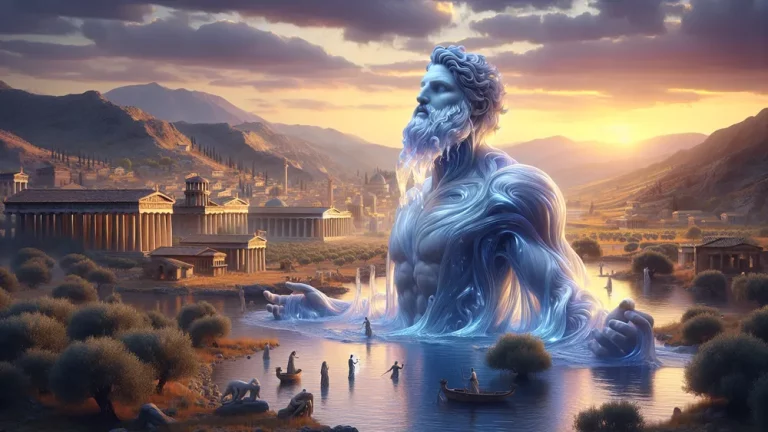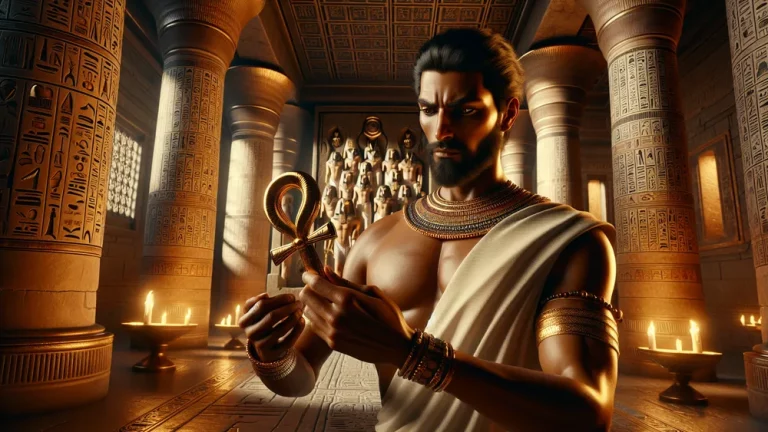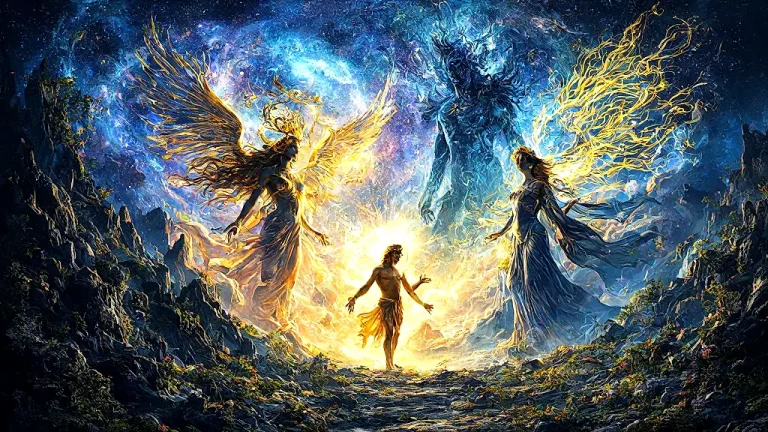Tano: The River God
Myths, much like history, usually rely on written stories, spoken traditions, and things people find from the past to figure out which gods, spirits, and legendary creatures existed in old beliefs.
Key Points:
- The name Tano comes from Akan traditions in Ghana, where it is linked to a river and a spirit connected to war, protection, and nature.
- Most stories about Tano were passed down by speaking, so there are not many written records about it.
- In African and other beliefs, gods and myths sometimes disappear from history when they are not written down.
- The word Tano means five in some African languages, but there is no clear connection to the river spirit.
- Across different cultures, the number five often has deep meaning, appearing in myths, religion, and nature-related ideas.
- Some African gods and spirits were forgotten over time, especially when people stopped retelling their stories.
- Tano was an important spirit in Akan beliefs, but without much written proof, people are still trying to understand its full role in mythology.
But sometimes, certain names, such as “Tano,” do not appear as often in well-known books about mythology, which makes people interested in myths ask questions about what they mean or why they are missing.
When studying myths, not having written proof of something can sometimes be just as useful as the stories that were saved, since it can tell us many things, such as how spoken storytelling kept myths alive, how cultures changed over time, and how history sometimes makes things disappear completely.
This article will focus on one main question: Does a god or mythical figure named “Tano” exist, or was its meaning never written down? By looking at myths from Africa and other places, we will search for connections, patterns, and ideas to decide if “Tano” has a place in old religious stories or if it is something no one has fully found yet.
Tano: Overview and Key Facts
| Category | Details |
|---|---|
| Name | Tano |
| Where It Comes From | Mostly found in Akan stories from Ghana, but the name might also exist in other languages or religious beliefs. |
| What It Might Mean | In the Akan tradition, Tano is both a river and a spiritual being, often thought to relate to war, protection, and nature. The word might also have other meanings in different places and languages. |
| What It Is Linked To | The Tano River (one of the important rivers in Ghana) and a god-like figure in Akan spiritual beliefs. |
| What It Represents | Water, power, fighting, and protection in a spiritual sense. |
| Stories About It | Spoken stories talk about Tano as an essential spirit, but there are not many written records about it. |
| A Link to the Number Five (“Tano”) | The word “Tano” means “five” in Swahili and some other African languages. This makes people wonder if there is something special about the number five in religious thinking. But this does not mean it is always connected to the Tano from Akan traditions. |
| What Is Written About It | Not much has been written down. Most of what is known comes from spoken stories passed down in Akan communities. |
| Why It Still Matters Today | The Tano River is still a major landmark in Ghana, and some people still believe in aspects of the spiritual traditions linked to it. |
Unraveling the Mystery of Tano in Mythology
In different places, people have used the name “Tano” in languages, traditions, and cultural beliefs, but its role in myths is not fully clear. Some think it refers to a god or spirit, while others believe it only means something in a non-religious sense.
To find out if there is a god or legendary being named “Tano,” people need to look at old records, spoken stories, and connections to bigger ideas in myths. There are no simple answers, though. Some names and figures from the past were remembered in writing, while others were passed down through speech and changed over time.
Whether Tano fits into this or not is something that is still being figured out.
Why Isn’t There a God Named Tano? What That Could Mean
There is a difference between gods like Zeus, Odin, or Ra – whose stories were written down, carved into stone, and kept in religious books – and Tano, which does not appear in well-known collections of myths. But just because Tano is not found in those sources does not mean there was never a god or spirit with this name.
In many parts of the world, especially in Africa and some Indigenous cultures, stories of gods were not usually written down but instead passed from person to person through speech. This means that many gods, spirits, and ancestors were honored for generations but later forgotten or never recorded outside of the people who believed in them. One example?
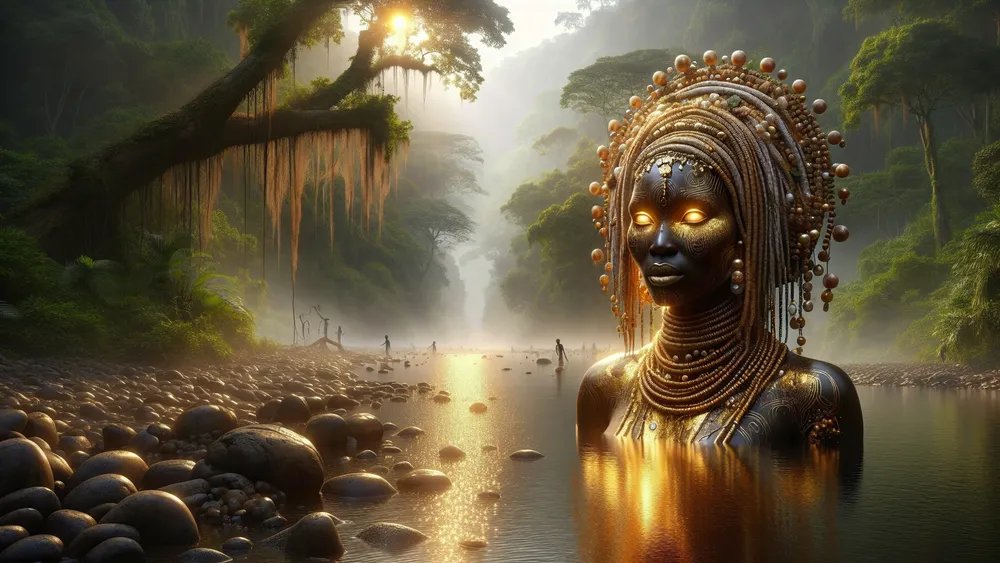
The Akan people of Ghana, where many important gods and river spirits were worshipped, yet only a few were ever written about in books. If Tano was a god people believed in, then its stories may have lived only in spoken traditions rather than in religious texts, like the myths from Greece or Hinduism.
This makes people think about something else, too: why do some gods and myths last forever, while others disappear from history because they were never written down?
Some gods, like Zeus or Odin, were written about and remembered, but others, like Tano, may have existed only in spoken stories that eventually disappeared.
The Power of the Number Five in Different Myths
Five is often seen as having an important meaning in myths and religions. It is used in many different traditions, sometimes about balance, sometimes about the connection between the physical and the spiritual. In Chinese thinking, the Five Elements (Wu Xing) – wood, fire, earth, metal, and water – are believed to form the basis of both nature and ideas about the world. These elements have been used in medicine, battle, and religion.
One belief in Hinduism is Pancha Mahabhuta, which talks about the five great elements: earth (prithvi), water (apah), fire (tejas), air (vayu), and ether (akasha). These are thought to make up the world. In Greek myths, five important rivers – Styx, Acheron, Lethe, Phlegethon, and Cocytus – exist in the underworld.
Each one is linked to something about death and what happens after life ends. It seems that in many places, people gave five a special meaning.
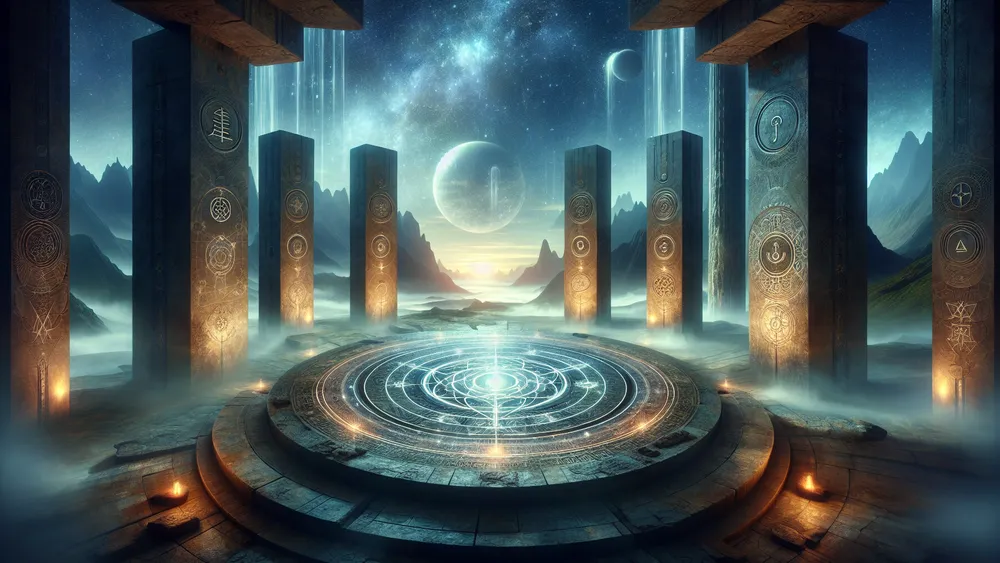
Other religions and traditions also treat five as something important:
- Islam: There are five important rules known as the Five Pillars of Islam. They guide how Muslims believe and practice their faith.
- Buddhism: People sometimes think of the human body as made up of five parts – form, sensation, perception, mental formations, and consciousness.
- Japanese Shinto: There are five natural forces – earth, water, fire, wind, and void – which are believed to shape the world.
- Norse Myths: The god Odin is said to have watched the nine worlds while hanging from the sacred tree Yggdrasil, though in some stories these worlds are grouped into five large parts.
- Mayan Calendar Thinking: The Mayan calendar includes time cycles that use the number five as part of how they measured the past and predicted the future.
These examples mean that, in many places, people saw five as something important, often linking it to completeness, change, or the way the universe is put together.
Does Tano Connect to African Myths? Let’s Take a Look
Looking at gods and spirits in African myths, one name stands out: Tano. In Ghana’s Akan beliefs, Tano is both a river and a powerful god connected to war, protection, and the natural world. The Tano River is among the most important rivers in Ghana, and the spirit tied to it is said to be both kind and dangerous.
Unlike well-known gods such as Osiris from Egypt or Shango from Yoruba stories, stories about Tano were mostly kept through spoken word rather than writing. This means that different groups had different details about Tano, and not all stories say the same thing. In Akan beliefs, river gods (abosom) are seen as go-betweens for the human world and the spirit world, so Tano was likely highly respected in religious life.
Outside of this tradition, the name “Tano” sounds similar to certain words in some African languages, but this does not always mean they are connected in myths.
For example, in Swahili and other Bantu languages, “tano” means “five”, but there is no clear link to the god Tano. Some researchers think that Tano may have similarities with other gods in West Africa, especially those tied to battles and rivers, but since few records exist, it is difficult to confirm.
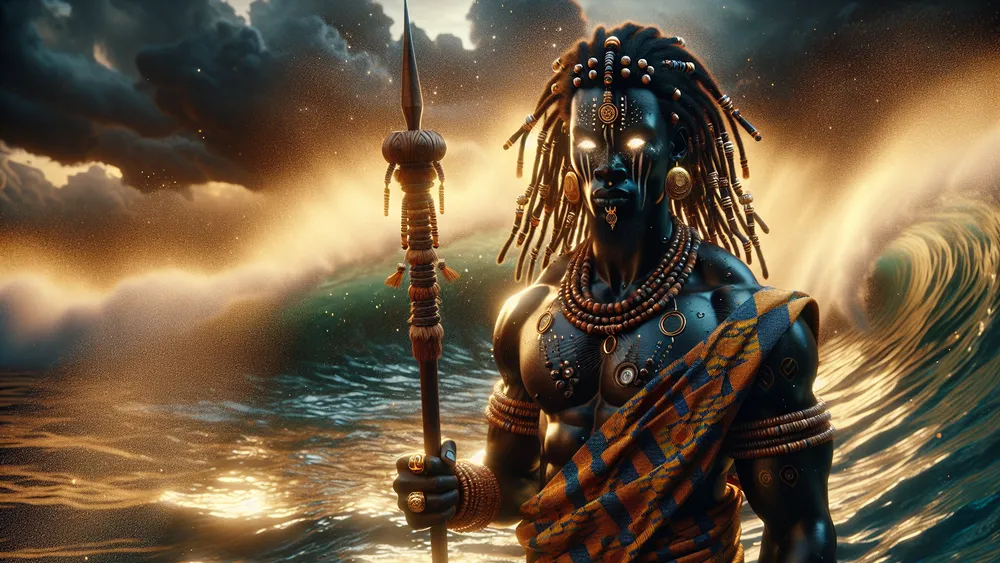
This means there is a bigger issue: many religious stories in Africa were passed down by speaking, not by writing. Over time, that caused many gods and spirits to be forgotten because their stories were never written down.
Gods with Five Faces from Around the World
One important example from Hinduism is Shiva, a god who sometimes appears with five faces. This form is called Panchamukha Shiva, which means “Five-Faced Shiva.” Each face stands for something different about how the divine works. The five are: Sadyojata (creation), Vamadeva (preservation), Aghora (destruction), Tatpurusha (hiding things), and Ishana (revealing things). They also match the five basic elements – earth, water, fire, air, and space.
Another form of Shiva, Mahākāla, is shown with five faces too, especially in some Tantric traditions. That version of Shiva is believed to go beyond time and space completely. These figures mean that the number five has an important role in religion, especially in ideas about the universe and how it works.
In African religions, gods with five faces are not as easy to find, but the idea of gods having many sides is common. Many religious systems there have gods and spirits – like the orishas, abosom, or vodun – that have different parts to them but still remain one being. One example is the Yoruban orisha Obatala.
He is thought of in many forms, with each one being connected to a different part of life. This is similar to how Shiva’s five faces each represent different forces of the universe. The number five is also seen as important in different ways in African traditions, often in rituals or ideas about the world.
The Akan people of Ghana, for example, believe in powerful divine forces linked to nature, and their god Tano is connected to water. Though it is rare to find gods with exactly five faces in these traditions, the idea that gods have many sides can be found in both Hindu and African religious thought.
Why Some Myths Were Never Written Down
A lot of famous myths exist today because people wrote them down long ago. But many other gods, spirits, and stories did not survive, or if they did, they were never written down. Some were lost completely. Others still remain, but only in pieces. Because people told these stories by speaking instead of writing, many parts were forgotten over time.
That caused myths to change, sometimes in small ways, sometimes in big ways. In the end, only scattered parts of these legends are left, and nobody can know the full versions as they were when they were first told.
The Myths We Lost – Why Some Gods Were Never Recorded
There were many myths people believed in long ago, but some of these did not survive because they were kept through speaking instead of writing. Instead of writing books or carving words into stone, people in many African, Indigenous American, and Oceanian cultures told stories out loud, using rituals or performances. But outside forces changed things.
Colonialism, religious conversions, and globalization all played a part in making these stories disappear faster. In many cases, European colonial governments made people stop following their religions, and that meant their stories also faded. New religions and outside stories took their place, and myths that had been told for many generations were no longer passed on.
At the same time, stories told out loud slowly change as time passes. Different people tell them in different ways. Some parts are forgotten. Other things are added. Because of this, it is very hard to find a single “first version” of many myths, and when something is never written down, there is no way to know exactly how it once was.
Over time, many gods and spirits that people once believed in were forgotten. Some only remained in old notes made by anthropologists or missionaries, but even those records do not always tell the full story.
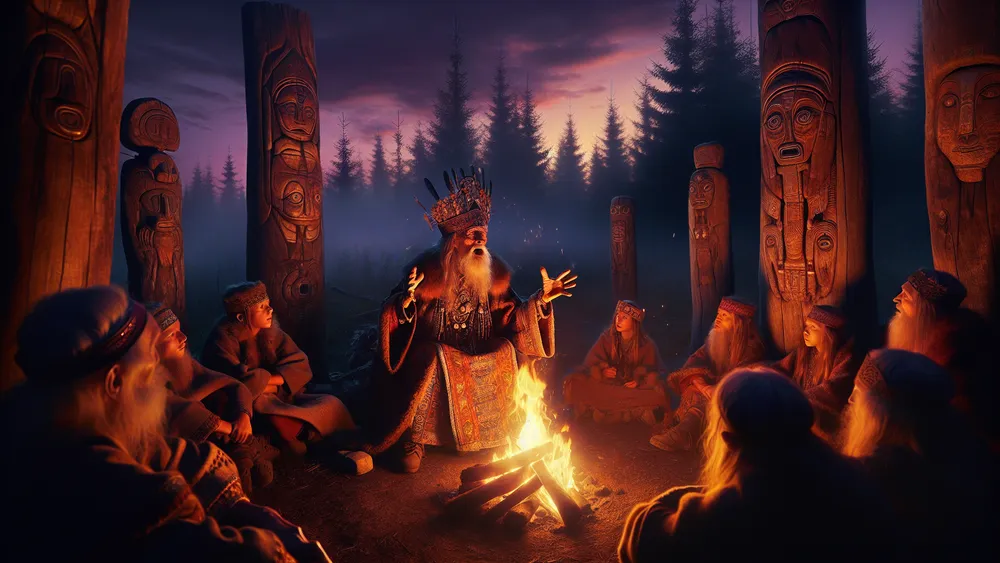
Forgotten African Spirits and Gods
There are many gods and spirits in Africa that people used to follow. Some had a significant place in religious life, but they became less known because their stories were passed on by speaking rather than being written down. In places where Bantu-speaking communities lived in Central and Southern Africa, people honored different gods and spirits.
Some survived in memory, but only a few were ever written down by European researchers. One example is Kazooba, a creator god from the Banyakole people of Uganda. He was honored for a long time, but there are not many records about him outside of stories that people told.
In many other areas, gods related to rain and farming were important, yet their names and what they represented were often very different depending on the group. Because these beliefs lived through spoken words, rituals, and songs, and not writing, many gods faded from people’s minds, while younger generations moved toward different beliefs.
Some gods within bigger religious systems remained hard to learn about. For example, Nzambi Mpungu is a well-recorded god in BaKongo traditions, but smaller spirits connected to places in nature or certain groups of people were rarely written down.
People only kept their stories alive through rituals and spoken teachings. A similar thing happened in Benin’s Dahomey religion, where Vodun deities like Dan (a god linked to snakes, knowledge, and fertility) remained well known, yet other regional spirits mostly disappeared from written memory. Over time, many of these gods were forgotten.
Christianity and Islam spread, and colonial rule also made more of these gods disappear. Those in power often discouraged or banned certain religious practices, and new religions took their place. Some gods still exist in memories and cultural traditions that survive, but many are only remembered in parts – sometimes in notes made by researchers or missionaries, though these accounts do not always tell the full story.
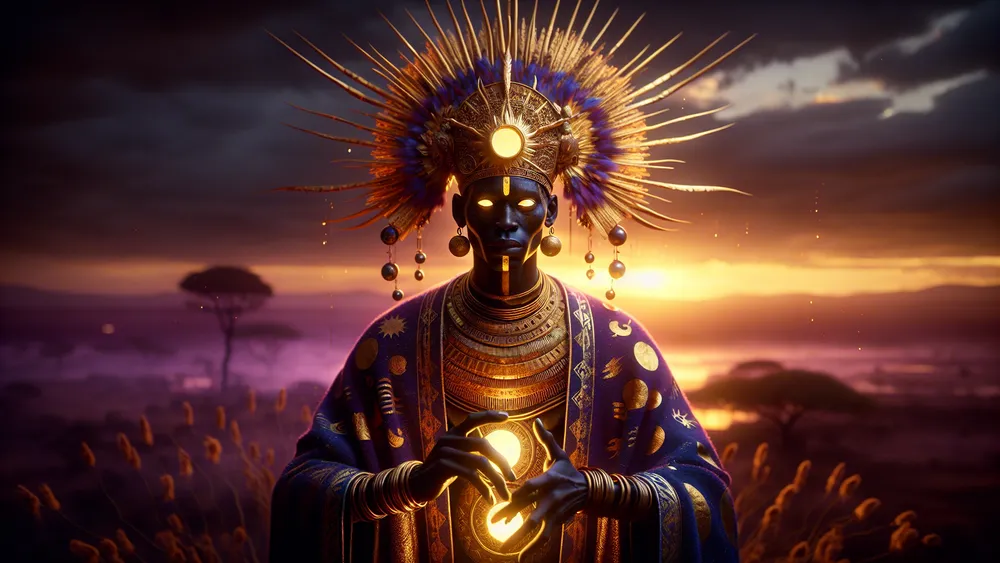
Many African gods and spirits were once important, but because their stories were passed down by speaking instead of writing, many were forgotten over time, especially as new religious beliefs spread and colonial rule discouraged old traditions.
Mythological Creatures and the Meaning of Five
Like gods and spirits, some numbers are attached to myths, and five is one of them. In different places, people see five as a number with strong meaning. Some say it stands for strength, change, or balance in the universe. It appears in different myths, where its connection to these ideas can be seen in the creatures that are part of those stories.
Some myth creatures have special shapes or abilities that connect to this number. This means that their forms and what they can do remind people of what five represents. The link between numbers and myths is something that appears again and again in different cultures, and five is one number that comes up often.
Beasts That Take Five Forms in Ancient Stories
In different myths, some creatures have five heads, five limbs, or five bodies. People see this number as connected to strength, change, or disorder. Greek mythology speaks of Typhon. He is one of the most terrifying creatures. Some say he has five heads that breathe fire, which means he is seen as a force of destruction that nothing can stop.
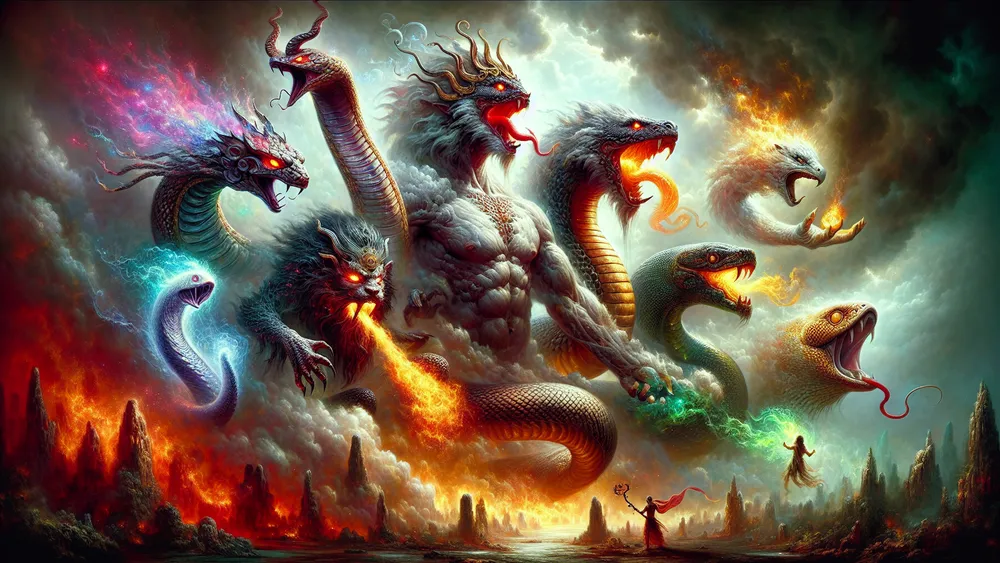
In the same way, the Nāgas in Hindu and Buddhist traditions usually have seven heads, but some stories describe them with five instead. This means they have power over the five elements. In African mythology, five is a significant number in certain creatures as well. Some West African stories tell of spirits that change into five kinds of animals depending on where they are.
This connects them to the natural world itself. Because oral traditions have disappeared, a lot about these beings is unclear. But their existence means something – different cultures have connected the number five to holy power and change.
Elemental Creatures in African Legends
In different parts of Africa, people believe in spirits and creatures that are tied to fire, water, air, earth, and spirit. These forces are connected to the world and thought to come from something beyond nature. Among the Yorùbá people in West Africa, spirits called Orisha control different parts of life, including the natural world. Oya controls storms. People say she commands strong winds that crash through the land.
That means air is not just something that moves – it is alive and powerful. In a similar way, Agwé in Haitian Vodou comes from earlier African beliefs and has power over water. He rules ocean spirits. In Central Africa, some stories mention snake-like beings that live in forests and rivers.
One example is Mbói Tu’i. These creatures, often seen as protectors of important places, seem to connect to both water and earth. Many people believe that spirits live in nature itself, and that these forces can either help or destroy.
Some have also suggested that forgotten gods or unknown spirits might be tied to the holy number five. It is thought that some African traditions follow a pattern of five basic forces: water, fire, earth, air, and a special energy, sometimes called spirit or the power of past ancestors. There are no clear records of a god exactly like Tano, but some old stories speak of spirits that change between five different forms. Some can become a storm cloud, flowing water, a strong wind, fire, or a shadow. Their names may not always exist in writing, yet they seem to prove that five was seen as an important number for creation, destruction, and the world itself.
Gods Named Tano and Their Mythological Links
The existence of elemental beings in African traditions seems to link natural forces and spirits. Some of these beings might not be remembered anymore. It is now time to look at certain gods, especially those named “Tano.” Across different cultures, they have different meanings in myths, and by looking at them, we can better understand these spiritual connections.
African Gods and Their Pantheon
African mythology includes many gods, all connected to different places, people, and beliefs. Some religions, like Greek or Norse ones, have gods that belong to a clear system. But in African traditions, it is different. Gods are often linked, not always separate, and they are part of things like nature, ancestors, or the powers that control the universe.
The Orisha in the Yorùbá religion, the Loa in Haitian Vodou, and the different gods of Akan, Igbo, and Zulu traditions help us see how broad and varied these beliefs are. A lot of these gods stand between people and the highest god. This means that divine power is strongly connected to both everyday life and nature itself.
For more details on these gods, you can check out this full list of African gods, where they are grouped by culture and what role they have in myths.
FAQs
1. Does a god named Tano exist in ancient African mythology?
A god named Tano does exist in ancient African mythology, specifically in the Akan tradition of Ghana, where Tano is a river deity associated with warfare and protection.
2. What does Tano symbolize in African spiritual traditions?
What “Tano” symbolizes in African spiritual traditions is primarily associated with the Tano River deity in Akan mythology, representing protection, justice, and natural forces.
3. Is there any historical evidence of Tano as a five-associated deity?
Historical evidence explicitly linking Tano as a five-associated deity is scarce, but some interpretations of Akan mythology suggest possible numerical symbolism related to the name.
4. How does African mythology compare to Greek and Norse mythological structures?
How African mythology compares to Greek and Norse mythological structures lies in its strong oral tradition, fluid pantheon, and ancestral veneration, whereas Greek and Norse mythologies are more rigidly codified through written texts and hierarchical deity structures.


